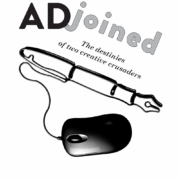A Novel approach to the challenges of our profession.
At some point, most copywriters have to …
- Deal with the ethical challenges of influencing consumers through our writing
- Handle rejection of our ads and concepts
- Learn how to gain confidence as a presenter
- Balance our work with our personal life
- Cope with the stresses of an ever-evolving industry
- Devise survival strategies as we age in an industry that puts a premium on youth
My new novel, ADjoined, delves into each of these issues. The story involves two advertising copywriters — Black millennial female, and White boomer male — whose paths eventually converge as teacher and student. In these roles, they bridge their disparate life experiences to form a symbiotic bond that helps them appreciate their own worth and advertising’s potential to mirror all that is good in the human race.
Having spent 16 years as an agency copywriter/creative director, 13 as a freelancer, and 10 as a copywriting professor, many of my personal experiences turn up in the career of the boomer character, Ted Canby.
Table of Contents
Ethical Issues
At the dawn of the Women’s Lib movement in the early ‘70s, Ted gets assigned an ad designed to recruit women into the typing pool of an insurance company. The ad pictured a woman, but with a typewriter placed where her head would be. Ted believed his headline — We don’t see you this way at Midwestern Mutual — would make the ad more than palatable to feminists.
He was surprised to learn that women complained the ad perpetuated the stereotype of typists as invariably female. The following week, the visual was revised to include a typewriter-headed man next to his female counterpart. Ethical considerations need to be examined in the context of the ongoing changes in societal norms.
Handling Rejection
Ted is frequently plagued — as I was — by creative work being shot down, not only by clients but by bosses within his agency. For a long-lasting battery, he writes a song called Staying Power to be used in an ad showing people displaying their perseverance, tackling various projects in which a long-lasting battery plays an important role.
While Ted felt his lyrics comprised some of the best work he’d ever done, his ACD shot down the project, contending that consumers would not be able to see beyond the sexual innuendo in “staying power.” Maybe the ACD had a point. Or maybe — just maybe — consumers would still be moved by the intended message of the ad.
Presentation Skills
Both of the central characters in the novel have an Achilles heel — a fear of getting up to speak before their peers. Of course, in advertising, poor presentation skills do not bode well for career advancement. Assessment of a creative concept is subjective and often depends on the performance of the person presenting the concept.
Ted languishes as a perpetual senior copywriter. Only as a teacher does he find the confidence to put his best face forward. Drawing upon his own experiences, he counsels Riva, his student, to help her overcome her similar affliction
Work/Life Balance
Work-life balance is a universal issue, but it can be particularly challenging for copywriters. You can never be 100% sure you’ve found the best possible headline for an ad. So you come up with hundreds of lines. You keep thinking, after hours. And because it’s so easy to take your lined yellow pad home, you keep working on it at night. And into the weekend. You take that lined yellow pad into bed with you.
Perfecting the work can become an obsession. In ADjoined, Ted’s obsession wreaks havoc on his marriage. I don’t think I was as obsessed as Ted, but who knows? Maybe you should ask my wife!
Coping with Change
In ADjoined, the advertising world serves as the backdrop for a tale spanning 75 years. You only have to look at ads from 75 years ago to realize how much advertising has changed. Doctors can no longer recommend Camel cigarettes. Babies can no longer be seen sipping 7 Up. Everything is different now — society, technology, humanity. Whereas people used to view ads as news, they now view them as ads —if they view them at all.
Ted’s formative years take place during the Creative Revolution, and he is fixated on traditional, non-digital media. Through Riva — his star millennial student — he learns how digital media provide new opportunities to capture sceptical consumers and keep advertising not only relevant but potentially critical to humanity’s advancement.
Continue Reading: Are we witnessing a new wave of illiterate copywriters?
Dealing with Ageism
Ageism has always been a threat to copywriters. Freelancers feel the threat less than agency staffers, but it still exists — and, to some extent, it’s justified. Once you hit 40, it becomes tougher to assimilate the unrelenting barrage of new technology, new music, and new lingo. I keenly remember my embarrassment when an associate asked me why I wrote, “Open 24 hours a day, 7 days a week” instead of simply, “Open 24/7.”
As a 20-something agency writer, I wondered what happened to the over-40s. In the agency world, you either get promoted to creative director, go freelance, teach, or write for an in-house ad department. In ADjoined, Ted Canby tries all but the in-house option. Like me, he preferred freelance to agency life but found the greatest satisfaction in teaching.
No, it’s not easy being a copywriter. But recognizing that others share your trials and tribulations — and find ways of overcoming them — can help you stay in the game and come out a winner.
For additional information about ADjoined: store.bookbaby.com/adjoined1 or amazon.com/author/artnovak.



